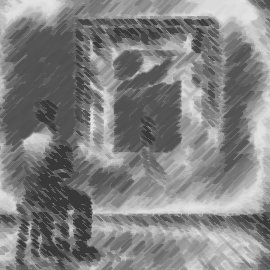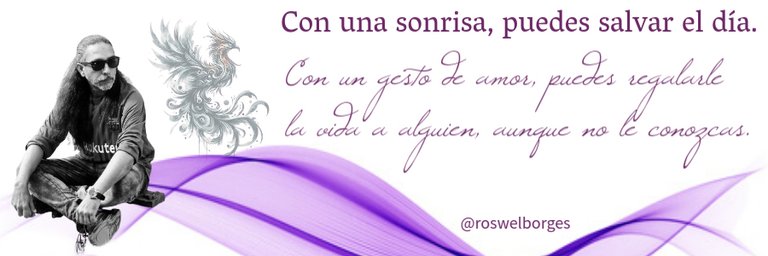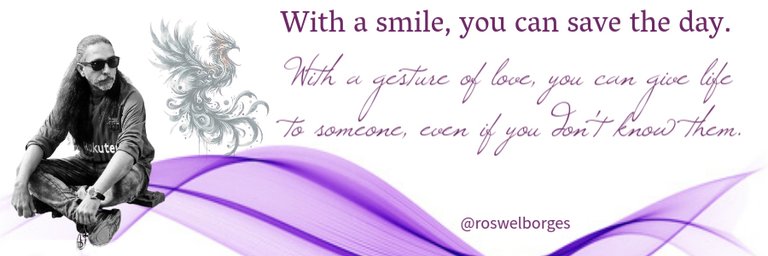¡Hola queridos seres de luz!
Con la añoranza de que todos hayan sonreído hoy, vengo a compartirles algunas impresiones sobre el tema que @emiliorios nos propone discutir sobre su iniciativa.
Dialogar sobre el silencio, su valor, su repercusión, su interpretación o su importancia en situaciones específicas, así como para la salud, se convierte en una meta compleja de abordar en su totalidad o, en alguna medida, en consenso según el punto de vista en su disertación.
Interesante cómo él nos estimula a partir de la necesidad de tocar el tema en función de lo que percibimos cotidianamente en las redes sociales, referente a fenómenos comunicacionales que moldean a la postre conductas y situaciones negativas, agresivas y hasta caóticas en sí.

Acá confluyen disímiles variables que siempre pueden influir en que se concreten una u otra expresión desde lo interpretativo y lo proyectado.
Hay que recordar que, en todo acto humano donde somos parte activa de un proceso comunicativo, no solamente expresamos un código —dígase símbolos, señales, sonidos—, sino varios, como puede ser la gesticulación de las manos, el cuerpo en general, los tonos de voz, el volumen, las expresiones del rostro, etc. Códigos éstos que no encontramos con facilidad precisamente en las redes sociales, lo cual contribuye a que casi siempre la interpretación de un texto no sea completa, a no ser que los interlocutores establezcan previamente un vínculo acertado de simbologías a interpretar por ellos.
Luego está el hecho de que somos nosotros los que decidimos actuar de un modo u otro ante situaciones diversas. Me refiero a que, puede existir, por ejemplo, un llamado a realizar determinada acción en alguna red social, pero si yo considero que ello no coincide con mis valores, o que sencillamente es algo ante lo cual no pretendo vincularme por diferentes causas, pues tengo la opción de no hacerme de ello, o como reza el refrán echarle más leña al fuego. Este aspecto en sí mismo tiene otros modos de abordajes que harían mucho más extenso nuestro discurso y no es el objetivo. En definitiva, estoy seguro que muchas personas participarán en la iniciativa con visiones enriquecedoras sobre ello.
Ahora bien, desde otro ángulo de análisis, magistralmente Emilio nos induce a valorar al silencio como estrategia para mostrar asertividad de alguna manera, si es que así lo asumimos, porque también puede indicar sumisión o un acto de desvalorización de nuestro criterio por nosotros mismos a modo de auto sabotaje, perdiendo así oportunidades de establecer límites necesarios, tal y como es preciso en todo vínculo de relaciones sociales.
Acá hay varios aspectos aunados. Es cierto que en algún instante guardar silencio sea prudente y acertado, permitiendo que asumamos una respuesta asertiva, sin que ello signifique desvalorización alguna ni acto de sumisión para con los demás. Siempre que sea una acción, consciente o no, que tribute a una coherencia cognitiva y conductual donde no se provoque malestar alguno hacia la salud de los implicados, bienvenido sea.
El otro aspecto ronda el establecimiento de límites entre las relaciones sociales. En mi práctica profesional he comprobado que muchas personas subvaloran la importancia de establecer límites en los vínculos tradicionales y luego se enfrentan a situaciones donde su salud se deteriora, precisamente por guardar silencio como mecanismo de auto sabotaje al no encontrar herramientas que les permitan la búsqueda de soluciones por ellas mismas.
Entonces me detengo acá en lo relativo a la salud y el silencio.
Puedo estar en silencio porque soy una persona poco comunicativa, porque sencillamente deseo estar callado y lo disfruto según los momentos de la cotidianidad, no hablar porque la educación formal me indica que hay precisas situaciones que así lo refieren, o porque me extrajeron algunos dientes y me resulta imposible articular palabra alguna.
Estos ejemplos, no tienen por qué devenir expresión negativa. Sin embargo, cuando ya el silencio se trata de acumular tensiones, de no procesar o exteriorizar funcionalmente nuestras emociones, sentimientos, ahí la cuestión sí puede llegar a consecuencias nefastas.

Es común que exista el miedo a expresarnos, por muchas cuestiones, y este temor también acumula la posibilidad de somatizar patologías que pueden ser a la postre irreversibles.
Pudiera referirme a la Ley del Hielo, pero solo pregunto: ¿a quién beneficia?
Considerando que me he extendido, voy a concluir sugiriendo que, amén de las características personales de cada cual por supuesto, pensemos en la práctica del silencio consciente como aquellos que aprenden a meditar en su día a día. Quizás así demos un primer paso hacia el redescubrimiento de nosotros mismos con una mejor predisposición a construir nuevos caminos que reverdezcan el entorno del cual formamos parte.
Hasta aquí, si aún estás silencio, te animo a que respires profundamente y sonrías cuando exhales el aire.
Luego, cuéntame qué te parece.
¡Abrazos a todos!
¡Gracias @emiliorios por el tema!
Las imágenes fueron diseñadas y realizadas por mí a través de Microsoft Bing y editadas en Adobe Illustrator.


Hello, dear beings of light!
Hoping that everyone smiled today, I'm here to share some thoughts on the topic @emiliorios is proposing to discuss regarding his initiative.
Discussing silence, its value, impact, interpretation, and importance in specific situations, as well as for health, becomes a complex goal to address in its entirety or, to some extent, to reach consensus, depending on the perspective of his dissertation.
It's interesting how he inspires us to address the topic based on what we perceive daily on social media, referring to communication phenomena that ultimately shape negative, aggressive, and even chaotic behaviors and situations.

Here, a variety of variables converge, which can always influence the realization of one or another expression from the interpretive and projected perspectives.
It must be remembered that, in every human act where we are an active part of a communicative process, we express not just one code—symbols, signals, sounds—but several, such as hand gestures, body language in general, tone of voice, volume, facial expressions, etc. These codes are not easily found on social media, which means that the interpretation of a text is almost always incomplete unless the interlocutors first establish an accurate link between the symbols they are meant to interpret.
Then there's the fact that we are the ones who decide to act in one way or another in different situations. I mean, there may be, for example, a call to take a certain action on a social network, but if I feel that it doesn't align with my values, or that it's simply something I don't intend to engage with for various reasons, then I have the option of not doing it, or as the saying goes, adding fuel to the fire. This aspect in itself has other ways of addressing it that would make our discourse much longer, and that's not the objective. Ultimately, I'm sure many people will participate in the initiative with enriching perspectives on it.
Now, from another angle of analysis, Emilio masterfully leads us to value silence as a strategy to show assertiveness in some way, if we assume it as such, because it can also indicate submission or an act of devaluation of our own judgment as a form of self-sabotage, thus losing opportunities to establish necessary limits, as is required in any bond of social relations.
There are several aspects here. It's true that at times, remaining silent is prudent and appropriate, allowing us to assume an assertive response, without implying any devaluation or act of submission to others. As long as it's an action, conscious or not, that contributes to cognitive and behavioral coherence that doesn't cause any discomfort to the health of those involved, it's welcome.
The other aspect concerns establishing boundaries between social relationships. In my professional practice, I have found that many people underestimate the importance of establishing boundaries in traditional relationships and then face situations where their health deteriorates, precisely because they remain silent as a self-sabotaging mechanism, lacking the tools to find solutions themselves.
So I'll pause here regarding health and silence.
I can be silent because I'm not a very communicative person, because I simply want to be quiet and enjoy it in everyday moments, or because I don't speak because my formal education tells me there are specific situations that require it, or because I've had some teeth extracted and find it impossible to utter a word.
These examples don't necessarily have to be negative expressions. However, when silence is about accumulating tension, about not processing or functionally expressing our emotions and feelings, then the issue can have disastrous consequences.

It's common to be afraid of expressing ourselves for many reasons, and this fear also increases the possibility of somatizing pathologies that may ultimately be irreversible.
I could refer to the Ice Law, but I'm just asking: who does it benefit?
Considering my long-windedness, I'll conclude by suggesting that, aside from each individual's personal characteristics, of course, we think of the practice of conscious silence as those who learn to meditate in their daily lives. Perhaps this way, we'll take a first step toward rediscovering ourselves, with a better disposition to forge new paths that will green the environment of which we are a part.
At this point, if you're still silent, I encourage you to take a deep breath and smile as you exhale.
Then, tell me what you think.
Hugs to everyone!
Thanks @emiliorios for the post!
The images were designed and created by me using Microsoft Bing and edited in Adobe Illustrator.


